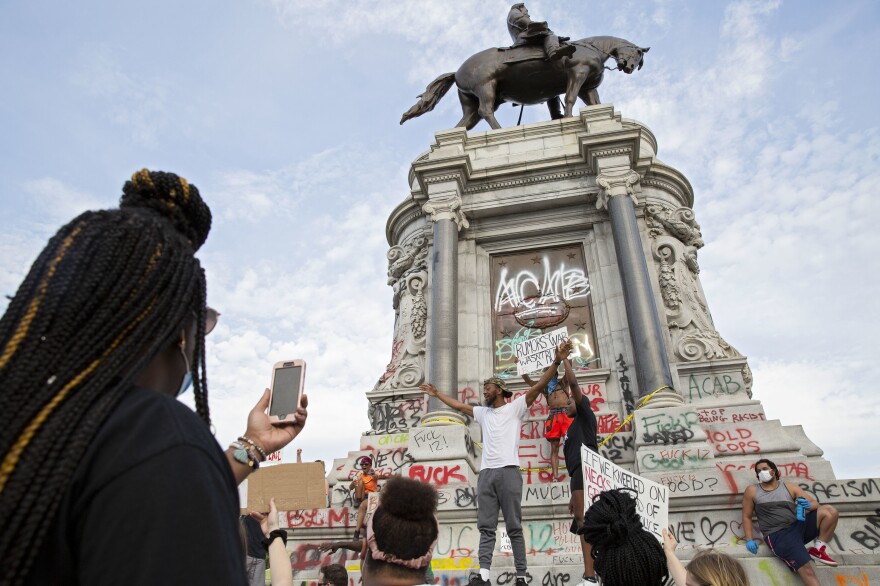Confederate monuments in the former capital of the Confederacy are being transformed into a new kind of icon as activists alter and pose for photos at the statues, one of which is at the center of a legal fight over its planned removal.
In recent days, photos have emerged online of teenage ballerinas dancing, activists holding flags and posing victoriously, and families gathering at the base of a statue to Gen. Robert E. Lee and other Confederate memorials in Richmond, Va. - now covered in graffiti including anti-racist slogans and messages.
Black people all over the city are doing photoshoots at the new and improved confederate memorials. I think this one is attributed to Aisha Shabazz. A nice throw-back vibe. pic.twitter.com/QGNmM8WIgQ
— Tressie McMillan Cottom (@tressiemcphd) June 11, 2020
Gregory Carden, 38, a Richmond known as Radio B, was among a group of artists, producers, and writers from the local hip hop community who gathered to pose this week in front of the Lee statue.
When he recently posed there for an upcoming album cover, he said, it was the closest he'd ever been to the monument.
"What struck me about that was how massive of a structure it was, how detailed it was," Carden said. "There was a lot of money and a lot of manpower and a lot of symbolism that went into creating that monument ... how much effort and how much care was put into the meaning of what that was there for, which was the oppression of my people."
This is what we do it for... #RiseOfRichmondRap #RevolutionofRichmondRap ✊🏿
— KillTheDreamer.com (@Radioblitz) June 11, 2020
Photo by @joey_wharton @rvamag pic.twitter.com/fW9E40WMuR
Carden sees the writing on the monument — which includes the names of black people killed in police custody — as a way of transforming the monument.
"For some people it looks like destruction; to me it looks like art," he said.
Another local hip hop artist, Rob Fields, 37, said he hopes the protest movement and calls for removal of white supremacist symbols will lead to political and systemic changes to address racial injustice.

"I want people to not care about whether or not there's a statue. I want people to focus on ... how we create longstanding change," he said. "If this is the tip of the iceberg, we cannot let the tip be more important than the actual iceberg itself."
Many activists are expressing hope that the removal of Confederate symbols will be more than symbolic.
Matthew Barbour, who's 30 and works in finance, recently posed in front of the Lee monument in all black, in honor of the Black Lives Matter movement. He said he was pleased to see activists of all racial identities gathering around the statue to protest — and pose — in recent days.
"The standing in front of it, the dancing — it symbolizes a level of freedom that black people have never had before," Barbour said. "As African Americans, it's freeing us to be able to connect with our counterparts, white people. I don't want to sit there and talk to you about the Lee monument all the time; we need to be able to go forward and talk about something else without that being in the background."

The statue has also become a gathering place for families, who come to document the moment together. Abriana Northington-Winston, 15, lives with her family outside Richmond. They chose the giant statue as an unlikely spot to celebrate her older brother's high school graduation; he posed in his cap and gown.
"It's in our DNA to persevere," Northington-Winston said. "All these obstacles thrown at us — we take something negative and turn it into something positive, something beautiful, something that represents our past and our future to come."

Northington-Winston said she hopes to see the statue itself come down, but she'd like to see the pedestal, covered in anti-racist messages, remain in place.
The Lee monument has stood for 130 years. In response to nationwide protests following the death of George Floyd in police custody in Minneapolis, Virginia Gov. Ralph Northam said it was time for the statue to come down.
That announcement has prompted lawsuits from Virginians who say the monument is part of the commonwealth's history and should remain in place, including a man who described himself as a descendant of one of its donors. The lawsuit says the commonwealth promised to "affectionately protect" and guard the statue.
Already, groups of protesters in the city have removed monuments to Jefferson Davis, the president of the Confederacy, and Italian explorer Christopher Columbus, who is known for his legacy of violence against indigenous people. Nationwide, there's a growing movement to remove Confederate statues and rename sites honoring the Confederacy.
Copyright 2020 NPR. To see more, visit https://www.npr.org. 9(MDAwMTM1NDgzMDEyMzg2MDcwMzJjODJiYQ004))



